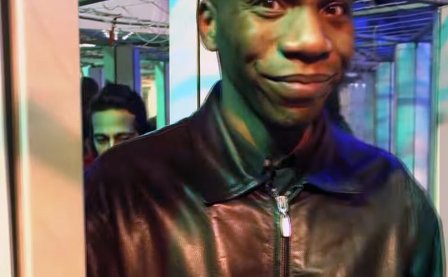“Kneel and kiss the ring,” A$AP Rocky demands on “LVL”, the fourth song on Long. Live. A$AP, the New York rapper’s major label debut. This precise lyric brings to mind a Raekwon song from 2009. Is it braggadocio sui generis or a knowing nod to an influence? There’s no way of knowing. Two songs later, A$AP Rocky borrows from Rihanna’s “Umbrella,” so direct homage is certainly not out of the picture. Rocky namedrops habitually, drawing associations between himself and other more reputable artists, largely from the south and west. Maybe it’s an unconscious quotation, almost verbatim, of something briefly encountered and all but forgotten. Rocky, a flamboyant figure, frequently calls himself pretty — as in Pretty Flaco, A$AP’s secondary moniker. But by now, I’m thinking about that Raekwon song, with its “Goodbye Yellow Brick Road” sample, and thinking that maybe being pretty isn’t as big of a deal in 2013 as having an Elton John feature was in 2009.
A$AP Rocky, as many rappers are wont to do, is fond of differentiating himself from his less sophisticated or talented peers. But the tone of Long. Live. A$AP is not one of sophistication, but of shamelessness, of blank-faced ugliness. What impresses most is not the content of Rocky’s lyrics, but the casual, unaffected tone with which they are presented. On “Fuckin’ Problems,” Long. Live. A$AP’s gangbang of a lead single, 2 Chainz admits that “he loves bad bitches” and that’s his “fuckin’ problem” — fair enough. Meanwhile, Drake takes care to inform you of his apparently blessed endowment, before closing with a limited-time offer of services rendered. It’s perhaps not the most flattering moment for either artist — though 2 Chainz’ funtime-goonery, his meathead charm, is perhaps better for lack of worry about good taste or proper behavior — but at the very least, neither boasts about “[turning] a dyke bitch out.” Nope, that’s Rocky.
To reiterate briefly — but not protest too much — the issue here is less depravity than dullness. More to that point, what’s problematic is that depravity doesn’t serve any real purpose on this record, unlike those by Tyler, The Creator, SpaceGhostPurrp, Schoolboy Q (who makes an appearance on Long. Live. A$AP), and MFN eXquire, where misogyny and self-loathing were inextricable, cleaved together in some awful Freudian conflict, where even the most repugnant claims were undercut by lacerating self-awareness and a punkish, puckish sociopathy. Here, Rocky doesn’t aim to provoke with his lyrics; they simply exist, liminal beats in the bass-heavy, somewhat ambient soundscapes that are his songs. I listen to any of the previously mentioned rappers and I hear pulp conviction, traces of William Burroughs and Jim Thompson. When I listen to “Fuckin’ Problems” — especially after the point at which Kendrick Lamar raps about “turning a pep talk into a pep rally” — all I hear is Steubenville Jock Jams.
Were this frequent reliance on kinda rapey imagery not paired with clueless attacks at “hypocritical Christians” on the title track, nor with other assorted claims of piety on Long. Live. A$AP and elsewhere, then maybe the calmness, the casual and privileged normalcy of his voice — “pop that pussy like it’s worth something,” he exhorts a sex worker at one point — wouldn’t grate as terribly as it does. Regardless, it bears noting outright that violent misogyny is hardly a recent presence in rap music — nor is religious inconsistency, for that matter — but it is a presence that is, today, most defensibly used in careful, conscious quantities and perhaps best voluntarily avoided.
Therein lies the biggest problem with Long. Live. A$AP: it’s hard to conceive of an artist as being a part of some progressive/futurist movement when they’re busy repeating many of the same ideas their precursors did first (often with more verve) and without the refinement, intelligence, or personality of their generational peers. It’s a shame that the beat selection is pretty phenomenal — Skrillex collaboration perhaps notwithstanding — but having good taste isn’t a recommendable talent in and of itself, at least not for a rapper. Think about Diddy.
Maybe that’s unfair. Sean Combs has proven tenacious enough that he’s earned the right to his vacuity. Rocky hasn’t paid the kind of dues that get you passes like that. And also, unlike Diddy, Rocky is capable from a technical standpoint; it’s simply creativity he lacks. He references other artists so frequently — 2Pac, Ma$e, Three 6 Mafia and Lil Flip, to name a few — that a sycophantic also-ran like the Game is perhaps a more closely analogous figure.
And while thinking of the repetition of familiar patterns, there are enough genre-hopping and synergistic, trans-genre partnerships present on the tracklist that Long. Live. A$AP, its commercial bets hedged, feels not unlike a myriad of other major-label rap disappointments from nearly any other era of rap. Two Kendrick Lamar verses aren’t enough to disguise the moribundity of the proceedings. This isn’t new ground or new school, just the same old halls newly decorated. There are certainly commendable elements to Long. Live. A$AP, but Rocky himself should not be counted among them.
More about: A$AP Rocky




